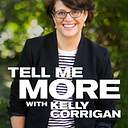On Finding Common Ground, Even Today
Recently, I heard myself say to my teenage daughter, Claire, “The thing is, we’re just not as unique as we think we are. I mean it’s safe to assume there’s always some common ground with whoever you’re at odds with.”
“Really? Even with the axis of awfulness?” she asked, referring to a Washington trio at whose feet I may have occasionally laid the problems of the world.
Pretending to be a better person than I am, I said, “Yes, actually. Even them.”
“Well it doesn’t feel like it,” she said, heading to her room. “All this election news makes it seem like there is only difference.”
Later, I wondered what do we all have in common?
Here’s what I came up with:
We were all born into idiosyncratic stories of the world told by imperfect people. Who’s right and good, who’s bad and wrong. We all came of age inside a value set that shaped our childhoods but then learned those values were opinions and choices rather than capital-T truths. Part of our work as adults is to interrogate those stories and decide what to adopt and what to reject. Setting our own moral codes in motion will tell us which protests to go to and what to write on our posters.
We also all live in bodies. This means we’ve all had a pimple, a toothache, we know bad backs and insomnia. We have all been hungry and stuffed, sweaty and cold, drowsy and flooded with adrenaline. We’ve all had our hair cut, sometimes poorly which means we have all had bad hair days. We’ve all taken a pill for something. We have been the patient on the table in strangely inadequate hospital gowns. We have seen our faces and skin and necks change. We’ve had blood draws and nose swabs and tests that come back with bad news.
Here’s a more impactful thing we all have in common:
We all process the world through a cognitive machine that is both miraculous and flawed. System limitations abound. These machines were designed for surviving a world that no longer exists and some their features — fight of flight, tribalism — haven’t caught up with evolution. I’ve heard said that we can unlearn and override the default settings but talking back to our bossy, persuasive minds is power lifting every time for everyone.
Another shared truth:
We all know all the emotions, though perhaps at varying levels of intensity. We have been stung by rejection, maddened by unfairness, left a room prickling with insecurity, embarrassment and shame. We have felt envy, flashes of lust, we’ve been snuck up on by greed. We have been made physically alert by fear, left low by disappointment and red faced by outrage. We have loved someone, viscerally. Many of us are parents and know how that love compels the animal part of us to protect at all cost. Many of us have folded up and disappeared into despair at the loss of someone we could not imagine living without.
Knowing love, feeling love, seeking it, finding it, giving it, falling in and out of it, being deformed by it, teaching it, correcting and perfecting it — that is quite a thing to have in common with another person.
And lastly, of course, we are all dying. Nothing could more clear than that as we bury hundreds, sometimes thousands, of Covid 19 victims every day.
So, yes, Claire, you are right. There is so much difference and separation. But it is also true that our common biology, our shared neurology and our ubiquitous capacity for love make for meaningful common ground in an America that often feels shredded, furious and armed to the teeth and we forget those common truths at our mutual peril.
Kelly Corrigan is the host of Kelly Corrigan Wonders, a podcast for people who like to laugh while they think.
